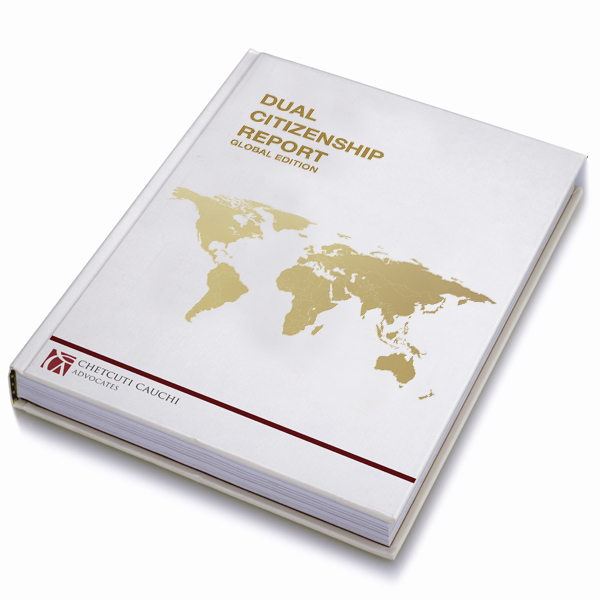
The Dual Citizenship Report Series
In light of the success of the first two regional editions of the Dual Citizenship Report, CCLEX is now pleased to publish the global report on Dual Citizenship. The Dual Citizenship Report series gives a clear understanding of the laws and regulations of countries and acts as an initial reference for individuals looking into attaining dual citizenship.
The first Dual Citizenship Report publication by CCLEX, evaluated dual citizenship laws within Europe, while the second edition focused on Russia and the Commonwealth of Independent States (CIS). As opposed to being centred on a specific region, the new Global edition of the Dual Citizenship Report is distinguishable since it examines dual citizenship laws in over 100 jurisdictions around the globe.
Both preceding editions of the dual citizenship report were well-met and praised as an insightful compilation of legal expertise. The Dual Citizenship Report series looks at whether a country or territory allows, restricts, or prohibits its citizens from holding dual and multiple citizenship. To ensure the utmost accuracy, each country chapter is strictly based on the feedback from law firms that provided critical assessment on the laws governing citizenship in their respective countries.
The Global edition expands on the insight accumulated in the previous editions to give a more comprehensive and comparative outlook on dual citizenship legislation worldwide. While incorporating and updating the country chapters from the previous regional editions, the report also includes over 50 new countries. The primary research for this edition of the Dual Citizenship Report was carried between January and March 2019, with recent revisions to citizenship laws all being taken into consideration.
Global Dual Citizenship
Over time, dual citizenship has become widely accepted, as is reflected in the Global Dual Citizenship Report. 60% of the jurisdictions under review in the report unrestrictedly allow dual citizenship, and only 20% completely prohibit dual citizenship with no special exceptions. Many countries have abandoned efforts to restrict dual citizenship rights, and have instead opted to integrate the concept into their legislations. This has occurred in response to a variety of developments, including increased migration flows, intensified pressure from diaspora communities, and the rising human rights phenomenon.
Most European countries allow dual citizenship, as do most countries in North America, Latin America, the Caribbean, and the Pacific. Dual citizenship laws in Africa and the Commonwealth of Independent States (CIS) region are more mixed, while Southeast Asia primarily stands out as being the most restrictive region as a whole with regards to dual or multiple citizenship. Countries including Malta, the United Kingdom, Cyprus, New Zealand, the United States, Saint Kitts and Nevis, Saint Lucia, and Canada, amongst others, permit dual citizenship with absolutely no restriction.
The Global Dual Citizenship Report substantiates that the practice of revoking the citizenship of citizens who naturalise in another country has been largely withdrawn. It is even rarer to find countries that require those who are born with dual citizenship do make a choice between the two citizenships upon reaching the specified age of majority or adulthood. Although some countries refrain from mentioning dual citizenship within their legislation, this also implies that dual citizens are not tied to down to any obligations, therefore such countries inadvertently allow dual citizenship.
While some countries allow dual citizenship and do not lay down any obligations for renunciation of either citizenship, they may still pose restrictions with regards to other aspects. Russia, for instance, does not allow dual citizens to be elected as members of the Federation Council or constitute/participate in the editorial office of a mass media or broadcasting entity, amongst other things. Australia also does not allow dual citizens to run for elected office. Other countries, including Russia and South Africa, allow dual citizenship on the condition that an individual notifies or registers with authorities prior to attaining dual citizenship.
Nevertheless, despite the increasing tolerance towards dual citizenship worldwide, certain countries still forbid dual citizenship, with some explicitly laying down that the acquisition of another citizenship is grounds for the automatic loss or revocation of citizenship. According to the Global Dual Citizenship Report, these countries include China, Monaco, Nepal, Ethiopia, Kazakhstan, and India. In some cases, such as Japan, Indonesia, and Estonia, an exception is made for children or adult dual citizens under a certain age. Upon reaching the specific age of majority, however, the individuals have to make a choice to keep one citizenship and renounce the other.
Other countries that do not normally allow dual citizenship make allowances in limited circumstances under certain conditions, including international treaties with specific countries or in the instances of birth or marriage. In the cases of European countries such as Bulgaria, Germany, and Latvia, dual citizenship is allowed in relation to EU member states, amongst other criteria. Spain, the Honduras, Nicaragua, and Pakistan, are among the countries that have a set of dual nationality agreements in place. Meanwhile countries including Austria, Lithuania, Norway and South Korea make allowances for dual citizenship for either dual citizens by birth, or dual citizens by marriage, or both.
All in all, as observed in the Global Dual Citizenship report, more and more countries have grown to tolerate and even recognize dual citizenship. Those countries that continue to prohibit dual citizenship are finding it harder to uphold restrictions in the face of increasing pressure and changing international norms towards the concept. The research team at CCLEX is eager to continue expanding on the research accumulated in the Global Dual Citizenship Report in the coming years by gradually increasing the countries under review.